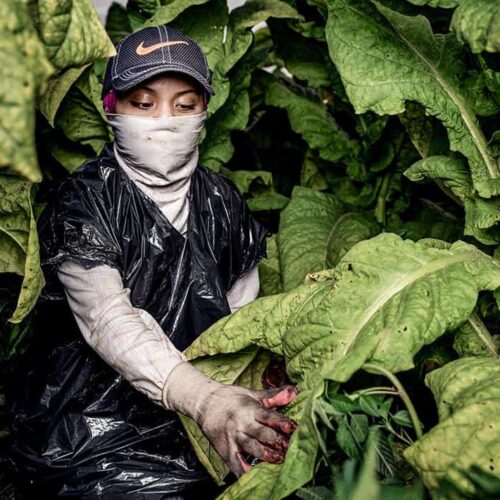Introduction
At a time when immigrants are in the national spotlight, a California congresswoman has reintroduced a bill to strengthen federal protections for children hired to work in agriculture, an industry that relies heavily on migrants from Latin America. The bill tightens labor standards for child farmworkers, whose protections under federal law fall short of those protecting minors working in other industries.
While federal law prohibits minors from working in non-farm industries until they’re 14, for example, children as young as 12 can be hired to perform farm labor. The proposed Children’s Act for Responsible Employment and Farm Safety, or CARE Act, would raise the minimum age to 14. This proposed rule change and others would be incorporated into the Fair Labor Standards Act.
“Agriculture is the only industry in which children as young as 12 are allowed to labor with virtually no restrictions on the number of hours they work outside of the school day,” the CARE Act’s sponsor, Rep. Lucille Roybal-Allard, D-Calif., said in a press release on June 20.
Children working in non-farm industries are prohibited by federal law from working before 7 a.m. and after 7 p.m. There are no such restrictions on agricultural work; the CARE Act would put them in place, maintaining exemptions for children working on farms owned by their families.
Roybal-Allard introduced the act in 2009 and again in 2013. The proposal failed both times to reach a floor vote in Congress. Supporters argue that the bill’s reforms are needed to ensure fair treatment — and to reduce health and safety threats to kids for hire.
“We don’t allow a 12-year-old to work in an air-conditioned office,” said CARE Act supporter Reid Maki, director of Child Labor Advocacy with the National Consumers League in Washington, D.C. “Yet U.S. law allows that same 12-year-old to work 10-12 hours a day performing back-breaking work harvesting crops — even toxic ones like tobacco — in temperatures that are often in the 90s and even 100 degrees.”
Children who work on farms also face loss of study and rest time — and feel pressure to drop out of school to help support their families. “Farmworker children pay the price for the inexpensive fruits and vegetables our nation consumes with their battered bodies, lost educational opportunities and broken dreams because they are forced to work just to make ends meet for their families,” said another CARE Act supporter, Mónica Ramírez, president of the Ohio-based Justice for Migrant Women.
“We don’t allow a 12-year-old to work in an air-conditioned office. Yet U.S. law allows that same 12-year-old to work 10-12 hours a day performing back-breaking work harvesting crops — even toxic ones like tobacco — in temperatures that are often in the 90s and even 100 degrees.”
CARE Act supporter Reid Maki, director of Child Labor Advocacy with the National Consumers League
In 2017, the Center for Public Integrity reported on young, undocumented farmworkers in California such as Leydy Rangel, who spoke of the difficulty of changing schools so she and her Mexican immigrant parents could follow jobs harvesting and pruning vines for table grapes. As she approached graduation, Rangel persuaded her parents to let her remain in a home in one city so she could finish school and have access to counselors to help her apply for college.
In 2015, the New York-based advocacy group Human Rights Watch released a report about 16- and 17-year-olds working in tobacco fields in North Carolina during summer months. The minors were mostly Hispanic U.S. citizens with undocumented parents. In interviews with researchers, the children said they took the jobs to help pay for school supplies and other expenses. Almost all said they experienced sickness and pain while tending to or harvesting leaves. Some said they experienced at least one symptom of acute nicotine poisoning, such as vomiting and dizziness. Research shows that nicotine can be absorbed through the skin.
“This painful stomachache hit me. It was so strong that I was crying at night,” one 17-year-old told researchers. “And I started puking. I think I threw up three or four times that day. It was so painful.”
Latino children, whose parents often are immigrants, work disproportionately in U.S. agriculture. Between 2013 and 2016, an estimated 65 percent of America’s farmworkers 17 or younger were Latino, according to a 2018 Government Accountability Office (GAO) report.
The CARE Act would also raise the age for young workers allowed to perform farm work that’s considered especially hazardous. The list of such jobs, according to the U.S. Department of Labor, includes working with pesticides or chemicals; driving a tractor or operating machines such as forklifts and chainsaws; handling dynamite; or working near a manure pit. Current law allows minors as young as 16 to work such jobs. The CARE Act would raise the minimum age to 18.
The bill also increases the maximum dollar fine for employers who violate a child labor regulation from $11,000 to $15,000 per employee. The proposal also imposes a possible prison sentence of up to 5 years if a violation results in death or serious injury.
The GAO found that agribusiness leads all industries for work-related child fatalities. Its 2018 report showed that from 2003 to 2016, 52 percent of 237 work-related deaths among minors in the U.S. occurred in agriculture. The CARE Act would require the secretary of labor to produce an annual report on such deaths.
If the CARE Act’s reforms are adopted, they would lead to changes in states that currently have less stringent regulations on age and working hours. In California, for example, businesses can employ farmworkers as young as 12, and at 16 kids can operate machinery and work in hazardous conditions. In Idaho, 16-year-olds can work in any industry up to 54 hours a week.


Join the conversation
Show Comments